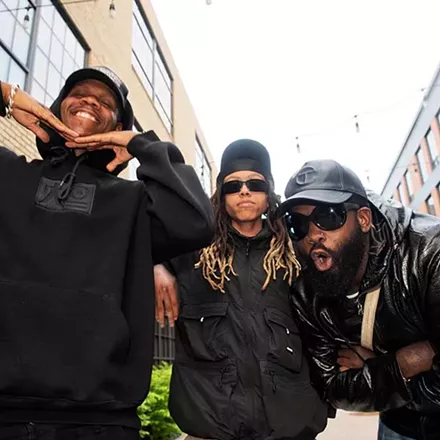St. Paul & the Broken Bones
Gritty soul septet St. Paul & the Broken Bones stay rooted in sweet home Alabama
By Patrick WallPaul Janeway lost the bet.
In mid-November, St. Paul & the Broken Bones, the electrifying soul band Janeway fronts, were slated to play a two-night stand at the Alabama Theatre in their hometown of Birmingham, Ala. At the time, the band was at the apex of its 2014 buzz, selling out clubs left and right and hitting the biggest stages on the festival circuit. But there was no way, Janeway thought, they would sell out the 2,300-seat theater—let alone do it two nights in a row. So, the band's manager made a friendly wager with the singer.
The band sold out both nights.
"She was really confident that we would," Janeway says. "And we did. That was extremely special. We weren't expecting that at all."
One of a crop of Alabama bands in the national spotlight, St. Paul & the Broken Bones breathe new life into the Yellowhammer State's rich musical history. Half the City, released exactly 51 weeks prior to the band's Feb. 11 show at The Urban Lounge, is a gut-punching reinvigoration of classic Southern soul. In the same way that Brooklyn's Daptone Records is reinventing classic Detroit soul, the Broken Bones keep rooted in the swampy deltas of their home state, the same loamy soil that spawned the Muscle Shoals sound. Mixed at the legendary Fame Recording Studios in Muscle Shoals, Ala., gritty, greasy cuts such as "Call Me" and "Don't Mean a Thing" echo the region's classic soul roots while extending the form with electrifying potency.
"It's part of who we are," Janeway says. "I'm born and raised in Chelsea, Ala. Most of us are. Most of us haven't lived anywhere else. It definitely influences us in a very large way. It's just a little different out here."
Alabama, certainly, is in the Bones' blood, and the band draws its membership from the state's deep talent pool. Organist Al Gamble and guitarist Browan Lollar, for instance, cut their teeth growing up in Muscle Shoals; Lollar spent time in Jason Isbell's 400 Unit touring band. And in Janeway, the Broken Bones have a real-deal soul singer, one who draws comparisons to Alabama soul legend Percy Sledge.
But in the same way that Janeway is the Broken Bones' biggest gun, he's also their secret weapon, mostly because he looks nothing like a soul singer. Chubby and bespectacled—and white—Janeway doesn't look like he'd possess the voice he does, a rich and reedy rafter-rattling roar that's somehow simultaneously smooth and rough and raw. Janeway grew up singing in a Pentecostal-leaning church in rural Alabama, and his bob & weave delivery and phrasing owe as much to his evangelical upbringing as to his favorite Stax singers. (Janeway's "St. Paul" sobriquet is a wry allusion to the vocalist's roots in the church, and that, unlike the rest of the six-piece band, he doesn't drink or smoke.) And as magnetic as his voice is, Janeway's stage presence is even more charismatic. He stalks and shakes and shimmies into some sort of holy-roller frenzy, diving to his knees and climbing on top of amplifiers and leaping onto tables in the crowd, sweating through his suits in the process.
Janeway looks more like a preacher (he was) or a bank teller (that, too), but when he opens his mouth, he's a dead ringer for classic soul singers like Otis Redding and O.V. Wright.
"A big part of me still likes showing up to places where nobody's heard of us, and people are like, 'What just happened?' I like that," Janeway says. "But I also like that expectations are built. Now people know I can sing. So it's like, now what?"
The septet is currently prepping its sophomore release, testing out studios and scouting producers. Janeway's still not sure where it'll land sonically, but the biggest thing, he says, is it has to have grit and soul. Consider the recording of Half the City: In contrast to the dense and finely tuned multitracking of radio-ready soul, the Broken Bones tracked everything live in the studio to capture the ferocity of their stage show. As long as the album has that grit and energy, the band won't limit itself as to what territory it explores.
"I think our biggest concern is what's the natural progression as a band," Janeway says. "Because this is an art form. So, for me, it's like, 'Where are we going? What music do we love? Does it make sense for this band?' For me, I love real instruments, and I love realness. But that's just me, that's just right now. Who knows? We could go '80s pop or something."
Don't bet against them—even if Janeway might. The singer has the same wager with his manager that he had in Birmingham for the Broken Bones' upcoming two-night stand at the 1,200-capacity Fillmore in San Francisco. One night's already sold out.
Janeway laughs. "It looks like she's going to win again."
More by Patrick Wall
-
They Might Be Giants
How reviving the years-gone Dial-a-Song revitalized They Might Be Giants
- Apr 29, 2015
-
Public Service Broadcasting
Space is the place for British duo Public Service Broadcasting
- Mar 25, 2015
-
Mark Kozelek
Veteran singer-songwriter Mark Kozelek is worth misunderstanding
- Jan 21, 2015
- More »
Latest in Music
Readers also liked…
-
The Alpines Head North
Local band's debut concept album finds musical bliss in the apocalypse.
- Feb 7, 2024









